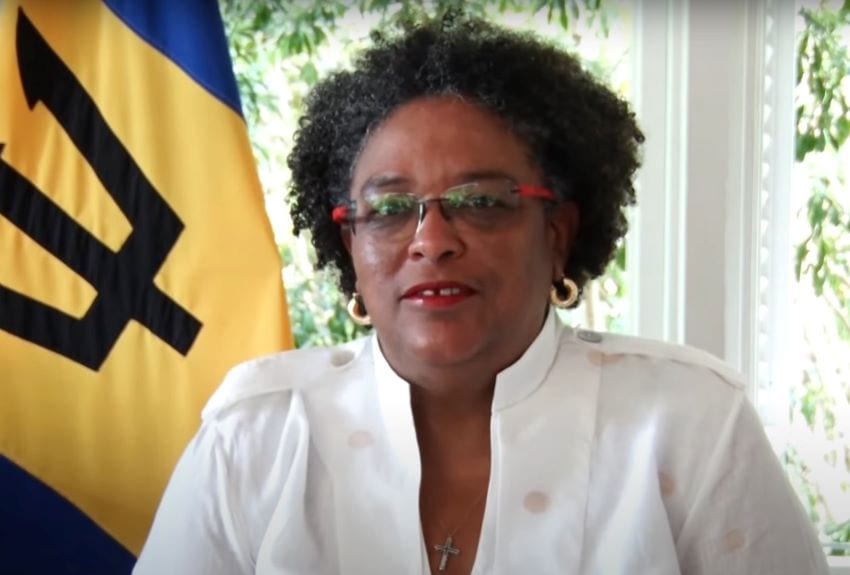
Government is committed to ensuring that the Barbados Public Service is counted as one of the best in the world.
Prime Minister Mia Amor Mottley shared this commitment on Monday, as she addressed the opening of the Commonwealth Advanced Online Training Programme in Government Performance Management, being held from April 26 to May 3.
Ms. Mottley encouraged senior public officers to continue working with Government to build the platform for increased productivity and efficiency.
“There is no greater thing that I would want to do than to make sure that the Barbados Public Service not only achieves the excellence that we want it to achieve, but that you are compensated for achieving it….
“So, let us find a way of measuring how we are improving; how we’ve added value each year, and I give you the commitment that if we can add value each year, then this Government is going to ensure that those who have been responsible for adding value, have the benefit of sharing in some of that value.”
The Prime Minister said Barbadians had been described as not being risk takers, not entrepreneurial and stuck in the wood. However, she stressed that had not been her experience.
“My experience has been that the systems that we have are very much that way, and the systems that we have, have constrained our creativity and possibilities, and our duty is to turn an analogue system into a real third decade of the 21st century, real life, interactive system.”
Ms. Mottley opined that since Independence, Barbados has had a comparative advantage in the quality of its Public Service, with the advice and actions rendered benefiting those who relied upon them.
However, she pointed out, others had “leapfrogged” this Public Service over the last two decades. “We have to ask ourselves whether our economy and our society are where they ought to be at this stage and …whether we have been able to maintain that upward trajectory or whether we have allowed ourselves to become stymied by challenges and systems that are no longer relevant to the time in which we live….
“We have a criminal justice system that is still driven by a Victorian philosophy and Victorian legislation, and that must change. We have an educational system that is still driven by educational reform determined by the British in the 1940s, when we were a colony. That is no longer appropriate to our circumstances, if we want to ensure that a larger percentage of Barbadians are given the right to receive the best possible education that they can have,” she stated.
The Prime Minister said it was clear the country was constrained by aspects of a colonial framework and system that had to be deconstructed and reconstructed to ensure that it became fit-for-purpose.

Ms. Mottley drew reference to the ease of getting a Police Certificate of Character noting that there were other services that could be digitised.
“But what cannot be digitised is how we treat to the delivery of social services and whether we are prepared to bring it together as one and to ensure that we move our philosophy from being institutionally-driven to being people-centred”.
“Nobody cares about whether the Child Care Board alone or the NAB alone delivers a service. What they care about is, has that elderly person or has that young child had…the services that they need in order to facilitate that transformation,” Ms. Mottley suggested.
She reminded the officers of the Public Service’s mission statement and tenets, which state: “We will come to work every day to make a difference in the lives of our people. We will do so by delivering the services in a creative and caring way that is fair and honest. We will treat everyone how we would want to be treated, and excellence shall always be our hallmark.”
The Prime Minister proffered the view, therefore, that officers should always display a caring attitude, be prepared to think outside of the box and be creative.
In underscoring the importance of the training, Secretary-General of the Commonwealth, Patricia Scotland, said the devastation caused by COVID-19, the eruption of La Soufriere Volcano and other natural and manmade disasters highlighted the challenges and promise of an effective government as well as the perils of an ineffective government.
“The central topic for this training programme – Government Performance Management – is very close to my heart. In my various ministerial roles in the British Government, I’ve seen firsthand the enormous difference that a small effort in improving government performance can make.
“Very often, we find that even when sufficient money is available, and even when good ideas are there, the government is not able to solve the problems it sets out to solve. Not because of lack of dedication or ability, but because the tools with which this gigantean task has to be dealt, need more joint attention. Invariably, with a little reflection, one can often trace the failure to connect the dots to poor performance management in government,” Baroness Scotland indicated.
The Secretary-General said leaders had realised that government performance was a major determinant of a country’s competitive and comparative advantage.
She expressed the view that the race among nations would be won by those countries with effective and efficient governments. Another group of senior public officers will also undergo this training, shortly.
